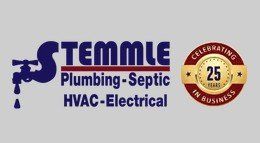Electric Water Heaters
ELECTRIC WATER HEATERS
Services / Water Heaters
/ Electric Water Heaters
Electric water heating has clear advantages over fuel-fired water heating in almost all situations. Electric resistance water heating’s primary disadvantage is higher operating costs relative to gas-fired water heating under many utility rates. Even in such cases, the other advantages of electric water heating often outweigh any operating cost differences. Heat pump water heaters and other high-efficiency electrotechnologies offer operating costs lower than or similar to those of fuel-fired units under all rates.
Safety
- Electric water heaters are safer than fuel-fired water heaters because they avoid the hazards and problems associated with using a combustion process to heat water.
- Combustible vapors. Fuel-fired water heaters present a potential safety hazard where flammable vapors may be present. Examples are garages, basements, and storage rooms where gasoline, paints, and cleaning fluids are stored. Flammable vapors are usually heavier than air and tend to collect near the floor. The draft effect of water heater pilot lights and burners causes the vapors to be drawn to the water heater where the pilot or burner can cause them to explode. The Consumer Product Safety Commission (CPSC) reports that during the period from 1986 through 1995, there were 4900 fire-related injuries and 341 deaths due to gas-fired water heaters and only 210 injuries and 18 deaths due to electric water heaters. Allstate Insurance Company is conducting a national safety campaign directed at ignition of combustible vapors by appliances. The campaign features full-page color ads illustrating the hazard of fuel-fired water heaters where combustible vapors are present.
- The CPSC data also indicates that every year people are killed by carbon monoxide produced by gas-fired water heaters.
Indoor Air Quality
Fuel-fired water heaters installed in occupied spaces create the potential for the release of combustion products into the occupied space. Damage to the flue or blockages are obvious causes. However, pressure differentials created by the operation of exhaust fans and HVAC systems or wind on the exterior of the building can also overcome the stack effect in the flue and allow flue gas to backdraft from the water heater into the occupied space.
Simplicity and Convenience
Electric water heaters are simple. Consequently, they are the simplest and most convenient way to heat water in both residential and commercial buildings.
Operating Costs
Under some utility rates, the cost of heating water with an electric resistance water heater is greater than the cost with a gas-fired water heater, liquid propane, and fuel oil. However, the cost difference is frequently overstated by not considering the efficiency of the water heaters.
Water heating energy and demand cost is only one of the many components of the total cost of owning and operating a water heating system. Electric water heaters typically offer cost advantages over fuel-fired systems for these other cost components, including design, installation, maintenance, service life, and effect on space conditioning loads. Where the total cost of ownership and operation are considered, electric water heating often has an overall cost advantage.
Even in situations where electric water heating is more expensive, it is frequently the preferred choice. Any cost difference is usually viewed as a small price to pay for avoiding the potential safety hazards and inconveniences associated with fuel-fired water heaters.
Codes
Codes and standards may impose special requirements on combustion water heating systems.
- Various codes require that fuel-fired water heaters installed in garages be elevated 18 inches above the floor to reduce the hazard associated with ignition of flammable vapors.
- A variety of codes and standards address combustion air supplies, exhaust flues, and other features associated with the combustion process used in fuel-fired water heaters.
Efficiency and Function
Electric resistance water heaters are more efficient than fuel-fired units.
Table 1 lists minimum energy factors set by the National Appliance Energy Conservation Act, NAECA, for various system types and tank volumes and maximum values. The maximum energy factor listed for fuel-fired units with power burners is 0.86. For units with atmospheric burners, the maximum energy factor is 0.64. Electric water heaters have energy factors as high as 0.95.
Lower Standby Loss
Because they are much better insulated, electric resistance water heaters have lower standby losses than fuel-fired units. Fuel-fired storage water heaters lose substantial amounts of heat through their flues and the un-insulated tank bottom. Typical fuel-fired water heaters lose about 3.5% of their stored heat per hour. Typical electric water heaters lose only about 1% per hour. Where hot water usage is low, the cost of operating an electric water heater can be lower than the cost for a natural gas unit.
Applications
Availability – Electric service is available almost everywhere a water heating system would be installed. Natural gas is not available in many areas, particularly in rural locations. While all buildings have electric service, natural gas service is optional. If not provided for other loads, installation costs and basic service costs must be recognized.
Point-of-use service – Electric water heaters are ideal for point-of-use water heating systems, where the water heaters are installed at or near the locations where hot water is required. Fuel-fired systems must be located where combustion air is available and flues can be installed. Locating the water heater closer to the hot water usage points reduces piping costs and piping heat loss and also reduces the wait for hot water at the fixtures. The need for recirculation loops and pumps is also reduced.
Electric water heaters are readily incorporated as supplemental units with solar water heaters, heat pump water heaters, and refrigeration heat reclaim water heaters.
Electric water heaters are convenient for use as booster heaters where higher-temperature water is required for special functions, such as dishwashing.
Design and Installation
- Location – Electric water heaters can be located almost anywhere within a building without the need for combustion air and flues. They can be placed under counters and in cabinets, avoiding the use of expensive floor space. With the high building costs in commercial buildings, a small amount of extra space can be quite expensive.
- Clearance around combustible materials – Fuel-fired water heaters require additional clearance from combustible materials.
- Gas piping – Gas piping must be routed to the water heater.
- Flues – Flues must be routed to the exterior of the building. Unless more expensive power-driven flues are used, the flue must be sloped upward to assure good draft. Flues are particularly difficult for water heaters located on lower floors and interior spaces away from the building perimeter.
- Combustion air – Fuel-fired water heaters require air for combustion. Air must be able to flow from the outdoors into the building and into the space where the water heater is installed. A substantial ventilation area is required.
- Interaction of combustion air and flue with other air moving systems – The interactions between a fuel-fired water heater’s combustion air system and flue and other building systems such as exhaust fans and HVAC units must be considered. Natural-draft combustion air/flue systems are particularly subject to poor performance with improper air balance in a building. When other air-moving systems create a low pressure inside the building, flue gasses may be drawn into the building interior rather than flowing through the flue to the outdoors. For example, if a restaurant exhaust hood provides excessive airflow or if a makeup air vent is blocked, the resulting low interior pressure can cause combustion gasses to flow downward through the water heater flue so quickly that the unit’s pilot light can be extinguished. This results in air-quality problems, safety hazards, and an interruption in hot water service.
- Effect of draft on infiltration loads – For fuel-fired water heaters inside conditioned spaces, building heating and cooling loads are increased by the flow of outdoor air into the interior for combustion and flue gas removal.
- Appearance of flue – Unless located in a hidden or unimportant area, a water heater flue on the building exterior can be unsightly. Architects and designers seldom consider them until after construction is complete.
Maintenance
Fuel-fired water heaters require more maintenance than electric units because of their greater complexity and the combustion process. Burners and flues are subject to corrosion and mechanical damage. Larger systems require periodic checks and adjustment of the burners to avoid declines in efficiency. Roof penetrations for flues present potential leak points.
System Life and Warranties
Electric water heaters
usually have longer service lives than fuel-fired units. Electric water heaters typically outlast fuel fired water heaters.
Fuel-fired water heaters present particular problems in environments where potentially corrosive airborne chemicals are present. Laundries and beauty parlors are examples of this. Detergent particles and chemicals in the air react in the water heater’s combustion chamber to form corrosive products that can cause rapid failure of the flue and tank bottom. Some water heater manufacturers specifically exclude such applications from their warranties.
Miscellaneous
All-electric rates – The use of electric water heating makes it possible to take advantage of all-electric rates and other utility incentives.
Call Stemmle Plumbing to service and install your electric water heater at (808) 744-6401
Michelle J.
“Stemmle is prompt and reliable. They had someone out in response to my call in less than 2 hours. Thanks to the fantastic crew at Stemmle!”
Stemmle Plumbing of Newport News
5706 Jefferson Ave
Newport News, VA 23605
(757) 283-2564
Stemmle Plumbing of Newport News
5.0 out of 5 based on 124 Reviews
Google reviews
★★★★★
5.0 out of 5 based on 124 Reviews
Google reviews
★★★★★
Stemmle Plumbing of Richmond
10900 Paulbrook Blvd
Midlothian, VA 23112
(804) 744-6401
Stemmle Plumbing of Richmond
4.7 out of 5 based on 459 Reviews
Google reviews
★★★★★
4.7 out of 5 based on 459 Reviews
Google reviews
★★★★★
© 2024
All Rights Reserved | Stemmle Plumbing-Septic-HVAC-Electrical




